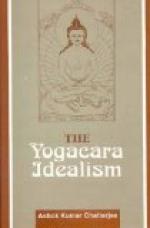|
This section contains 5,069 words (approx. 17 pages at 300 words per page) |

|
The origins of Yogācāra Buddhism—one of the two mainstream schools of Indian Mahāyāna Buddhism (the other being Madhyamaka)—are obscure, but tradition credits its founding to two half-brothers, Asaṅga and Vasubandhu (c. fourth century). Many of Yogācāra's distinctive terms and models, such as eight consciousnesses, three self-natures, and vijñapti-mātra (explained later in this entry), had already appeared in certain Mahāyāna scriptures such as the Saṅdhinirmocana Sūtra (Sūtra elucidating the hidden connections), but the expansion of those ideas in the prolific writings of Asaṅga and Vasubandhu gave the school its foundation. Yogācāra attempted to absorb the full range of teachings and practices that had arisen over the centuries since the time of the Buddha—from the elaborate scholastic schemas of the Abhidharma schools...
|
This section contains 5,069 words (approx. 17 pages at 300 words per page) |

|


